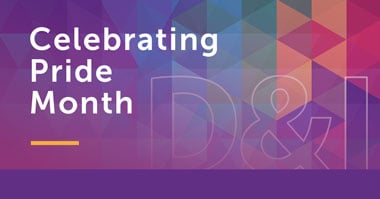
National Coming Out Day
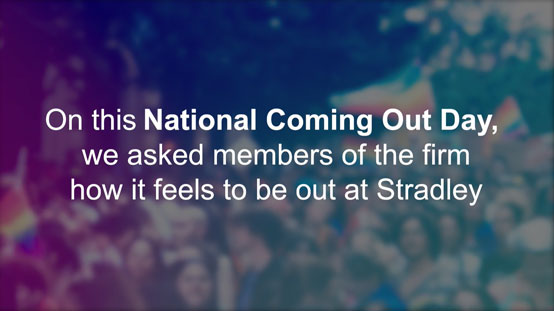
Coming out in the LGBTQ+ community continues to be profoundly important. Click here to hear from members of Stradley Ronon’s Queer and Allies (Q&A) Engagement Group on National Coming Out Day.
National LGBT History Month
Meet Associate and Chair of the firm’s Q&A Group, Queer & Allies, Evan Poulgrain. In this video, Evan shares the goals and initiates of our LGBTQ+ Engagement Group, and he talks about what it means to embrace being LGBT and his role model.
June is Pride Month, and the Stradley Ronon community is honored to commemorate the 1969 Stonewall riots, the progress in achieving equal justice and opportunity for queer people worldwide, and the heroes of the movement who lead the way for change.
Cameron Redfern and Brian Seaman Present ‘Promoting Inclusivity for Queer Employees’ in Celebration of Pride Month
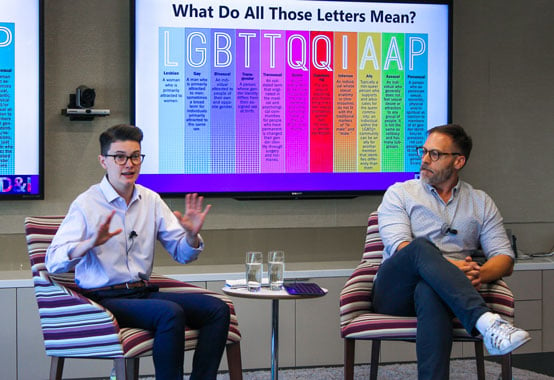
Stradley Ronon is pleased to announce that litigation attorneys and members of the firm’s Diversity Committee, Cameron Redfern and Brian Seaman, presented a CLE program “Promoting Inclusivity for Queer Employees,” on June 15 at the firm. The event, which was hosted in-person and virtually, focused on making conversations surrounding queer identity and inclusivity more accessible, and provided insight into fundamental issues. Click here for replay.
Members of the firm’s Queer Resource Group – Out at Stradley – spotlighted the history of Pride Month, the evolution of the Pride flag, and most importantly, the people who make Pride month what it is – attorneys and business professionals within Stradley and prominent activists and organizers whose legacies and contributions have impacted society as we know it today.
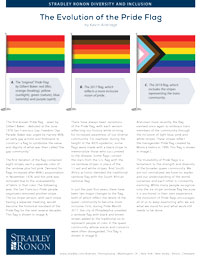 Everyone has seen the rainbow Pride flag. But did you know there are variations of the flag, with each version reflecting a unique history and an exciting sense of progress and inclusion? Kevin Aldridge, Stradley paralegal, pens an article for Pride Month outlining the meaning behind each flag.
Everyone has seen the rainbow Pride flag. But did you know there are variations of the flag, with each version reflecting a unique history and an exciting sense of progress and inclusion? Kevin Aldridge, Stradley paralegal, pens an article for Pride Month outlining the meaning behind each flag.
The Evolution of the Pride Flag
The first known Pride flag – sewn by Gilbert Baker – debuted at the June 1978 San Francisco Gay Freedom Day Parade. Baker was urged by Harvey Milk, an early gay activist and firebrand, to construct a flag to symbolize the value and dignity of what was then called “the gay community.” Read more...
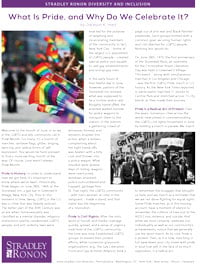 Of course, June wasn’t always Pride Month. Jackson Hart, former Stradley paralegal, pens an article explaining how this month became so important for queer people and how an evening of rebellion led to a generation of progress.
Of course, June wasn’t always Pride Month. Jackson Hart, former Stradley paralegal, pens an article explaining how this month became so important for queer people and how an evening of rebellion led to a generation of progress.
What Is Pride, and Why Do We Celebrate It?
Welcome to the month of June, or as we in the LGBTQ and ally community call it: Pride Month. For many, it’s a month of marches, rainbow flags, glitter, singing, dancing, and radical forms of self-expression. You would be hard-pressed to find a more exciting month of the year. Of course, June wasn’t always Pride Month. Read more...
As we celebrate and recognize the importance of Pride Month, we are spotlighting members of the Stradley Ronon Queer Resource Group. We asked Stradley’s Chief Diversity Officer Brian Seaman and associate Cameron Redfern, “What is the best part of being LGBT/Queer?”.
Stradley’s Kevin Aldridge and Samantha Slagle share who in their lives taught them to accept and embrace themselves as they are.
Stradley’s Pride Month spotlight series continues with Executive Director Gillian Facher. Gillian recounts her experience being gay in the world and at Stradley over the last 40 years.
Stradley’s Brian Seaman and Cameron Redfern share the members of the LGBT community and advocates of diversity and inclusion who acted as their gay mentors.
In the months leading up to this year’s Pride celebration at Stradley, the Out at Stradley Resource Group felt strongly it was important for them – and the rest of the firm – to know more about the individuals who helped to make Pride what it is today. In this series of short profiles, various Stradlians wrote about pioneers who set the foundation for LGBTQ pride and those people who continue the fight today.
-
Barbara Gittings
-
Brenda Howard
-
Jim Obergefell
-
Sylvia Rivera
-
Bayard Rustin
-
BD Wong

Barbara Gittings, a strong advocate of visibility, was a public face of the gay liberation movement long before there was safety in numbers.
In 1965, four years before the Stonewall riots in New York, which many view as the founding of the gay rights movement, Gittings helped organize the Annual Reminders each Fourth of July in front of Independence Hall in Philadelphia, which were the first public demonstrations for gay and lesbian equality.
Among a long list of other achievements, Gittings is credited with the founding of the East Coast chapter of the Daughters of Bilitis in 1958, the first national organization for lesbians, as well as a successful lobbying campaign that resulted in the American Psychiatric Association removing homosexuality from its list of mental disorders in 1973. And although not a librarian herself, she was a lifelong devotee to increasing access to gay literature and to combating discrimination in the nation’s libraries. For 16 years, she led the American Library Association’s task force that would later become the Rainbow Round Table.
Known by many as the “Mother of the LGBT Civil Rights Movement,” Gittings was also a proud daughter of Philadelphia, and in 2012, the city dedicated a portion of Locust Street in the heart of the city’s “gayborhood” as Barbara Gittings Way.

Brenda Howard is known as the “Mother of Pride” for her coordination of the first Pride March in New York City on June 28, 1970. Howard and fellow Gay Liberation Front members organized the event to mark the first anniversary of the Stonewall riots. Additional marches in Chicago, San Francisco and Los Angeles in 1970 formed the foundation for Pride parades — which now take place around the world.
Howard was a bisexual cisgender woman and sex-positive feminist. In the days when it was unusual for cis women to join the fray for LGBTQ rights, Howard was in the thick of it and was arrested while protesting in Chicago in 1988 and Georgia in 1991. She was also an active member of the Coalition for Lesbian and Gay Rights, ACT UP, and Queer Nation, and later BiPAC/Bialogue and BiNet USA.
Howard worked on both the 1987 and 1993 marches on Washington and on 1994’s Stonewall 25. She helped create the New York Area Bisexual Network as well as founded the United States’ first Alcoholics Anonymous chapter for bisexual people.
After her death in 2005, the Queens Chapter of PFLAG created the Brenda Howard Memorial Award. Given annually, the award recognizes an individual or organization whose advocacy on behalf of the bisexual community and the greater LGBTQ community exemplifies the service and vision of Howard.

Jim Obergefell is an American civil rights activist and author but is best known as the named plaintiff in Obergefell v. Hodges, which legalized same-sex marriage in the U.S.
“If I’m demanding equal rights, civil rights for me as a gay man, then I better damn well be demanding those same things for every other member of the LGBTQ+ community,” said Jim Obergefell on the LGBTQ&A podcast.
Before his name became a household word for marriage equality and LGBTQ civil rights, Jim Obergefell worked as a consultant and real estate agent in Ohio, living a quiet life with his husband. When Jim had first met John Arthur at the age of 26, he was closeted and working as a German teacher in Cincinnati. On their meeting, Jim said, “John scared the daylights out of me because he was out. He was so comfortable in who he was, so comfortable in being an out gay man that I thought for certain he was going to call me out.” Two more chance encounters, Jim’s coming out and a diamond ring later, the couple were deeply in love and committed to each other for 22 years. But their time was cut short when John developed ALS.
Jim proposed to John on June 26, 2013, when the Supreme Court released its decision in United States v. Windsor. Since same-sex marriage was illegal in Ohio, the couple chartered a medical jet and married in Baltimore, in the jet, on the tarmac. They soon learned that Ohio would not recognize their marriage and thus would not name Jim as John’s husband on his death certificate. Civil rights attorney Al Gerhardstein urged the couple to file suit and worked pro bono. Though John lived to see their case win in Federal District Court, he died three months later — less than four months after their wedding. On continuing the legal fight without his husband, Jim said, “I got to talk about John every single day. I got to talk about how much I loved him, what a great person he was, what an impact he had on me, and why our relationship was worth fighting for. That helped me with my grieving. I really feel lucky that I had that opportunity.”
It’s important to note that more than 30 plaintiffs were consolidated in the case of Obergefell v. Hodges, and as the named plaintiff, Jim feared their stories would be overlooked and forgotten. Jim named several couples and their children in his letter published the day of the decision, and you can read about their reactions in this article. And while it would be understandable for Jim to take a break from his highly public profile, he’s instead leveraged it for the continuation of rights for LGBTQ and all marginalized people. In this podcast, Jim said, “If I’m demanding equal rights, civil rights for me as a gay man, then I better damn well be demanding those same things for every other member of the LGBTQ+ community,” and took the queer community to task for disengaging after marriage equality, for their transphobia and racism, and for their inaction on the rights of other marginalized people.
LGBTQ people did not achieve equality on the day Obergefell v. Hodges was decided, and Jim stressed that our work was not done. A year after his SCOTUS decision, Jim wrote an impassioned plea for Congress to abandon the “First Amendment Defense Act.” He also made a public statement after the Masterpiece Cakeshop case and has been closely tracking employment discrimination cases and the latest SCOTUS decisions on such. Additionally, Jim co-authored the book Love Wins with Debbie Cenziper and co-founded Equality Vines.
Since September 2020, Jim has been working as director of individual giving at Family Equality, an organization that “advances legal and lived equality for LGBTQ+ families, and for those who wish to form them, through building community, changing hearts and minds, and driving policy change.” Most recently, Jim appeared in the docuseries Amend: The Fight for America.
While Obergefell the name will always be associated with marriage equality, Jim the person is a living reminder that equality for all is an ongoing battle, and he’s not backing down.

Sylvia Rivera, a proud transgender woman of color, was a foundational leader of the LGBTQ rights movement whose significance is too often overlooked, overshadowed, and misremembered.
Most people have heard of the infamous Stonewall riots — a series of uprisings by members of the transgender and gay communities following a police raid that began in the early morning hours of June 28, 1969, at the Stonewall Inn in New York City — which, today, are widely considered the pivotal turning point leading to the gay liberation movement of the 1970s and ’80s.
Despite the prominence of the Stonewall riots in the history books and mainstream media, Rivera’s leadership in those memorialized moments is often forgotten. In fact, it was Rivera, along with her self-proclaimed mother, Marsha P. Johnson, at the forefront of the LGBTQ rights movement on those nights. Rivera, only 17 years old at the time, was credited with “throwing the first rock,” though she has admitted it might have been the second. She resisted arrest and refused to go home for days, “not wanting to miss a minute of the revolution.”
In the years after the Stonewall riots, Rivera fought tirelessly against the exclusion of transgender people, especially transgender people of color, from the larger LGBTQ rights movement. Along with Johnson, Rivera started the Street Transvestite Action Revolutionaries in 1971 as a space to organize and discuss the issues specifically impacting the transgender community — issues the broader gay liberation movement disregarded. Rivera passed away in 2002 after many years of leadership and activism.
The Sylvia Rivera Law Project continues her legacy, working to guarantee that “all people are free to self-determine their gender identity and expression, regardless of income or race, and without facing harassment, discrimination, or violence.” The intersection of Christopher and Hudson streets in Greenwich Village, two blocks from the Stonewall Inn, was renamed Sylvia Rivera Way. In 2015, a portrait of Rivera was added to the National Portrait Gallery in Washington, D.C., making her the first transgender activist to be included in the gallery. In 2019, New York City announced that it would build a monument to Rivera and Johnson in commemoration of the 50th anniversary of the Stonewall riots, to be unveiled in 2021. It will be the city’s and, according to New York City, the world’s first monument dedicated to transgender individuals.

Bayard Rustin was a close advisor to Dr. Martin Luther King Jr. and one of the most influential and effective organizers of the civil rights movement. Rustin organized and led several protests in the 1940s, ’50s, and ’60s, including the 1963 March on Washington for Jobs and Freedom, at which King delivered his legendary “I Have a Dream” speech, leading him to be affectionately referred to as “Mr. March-on-Washington” by his mentor, A. Philip Randolph.
Rustin’s lifelong commitment to nonviolence began with his Quaker upbringing and the influence of his grandmother and was further solidified during a seven-week trip to India in 1948 to study the Gandhian philosophy of nonviolence. In the 1940s, he joined the Fellowship of Reconciliation (FOR) and co-founded the Congress of Racial Equality (CORE). Rustin organized campaigns and led workshops on nonviolent direct action for both organizations, serving as a field secretary and then race relations director for FOR.
Rustin became a key advisor to King during the Montgomery bus boycott. While Rustin’s homosexuality and former affiliation with the Communist Party-led some to question King’s relationship with him, King recognized the importance of Rustin’s skills and dedication to the movement. In less than two months, Rustin guided the organization of an event that would bring over 200,000 participants to the nation’s capital.
In the 1980s, Rustin came out publicly, telling The Village Voice, “I think the gay community has a moral obligation … to do whatever is possible to encourage more and more gays to come out of the closet.” He spent the last years of his life working to bring the AIDS crisis to the attention of the NAACP. Rustin died in 1987. He was awarded the Presidential Medal of Freedom by President Barak Obama in 2013.

BD Wong is one of the most recognizable Asian American actors in the U.S. and a tireless supporter of queer rights.
Wong gained wide attention — and a Tony Award — as a result of his Broadway debut in the play M. Butterfly opposite John Lithgow. In the play, Wong portrayed a female opera singer who is revealed as a man who disguised himself to seduce a French diplomat and extract information from him as a spy. To keep the main surprise of the show a secret, Wong used his initials instead of his full name, Bradley Darryl. Since then, he has also appeared on Broadway as Linus in You’re a Good Man, Charlie Brown and as the Reciter in Pacific Overtures.
Most Americans know Wong because he has likely been on someone’s television every hour of every day, whether as Dr. George Huang on Law & Order: SVU, Father Ray Mukada on Oz, or more recently Whiterose on Mr. Robot. Wong also holds the distinction of being the only actor to appear in all six of the Jurassic Park movies.
Wong is also a committed advocate of equity and diversity, especially in support of the Asian American and queer communities. He famously objected to the decision to cast a white actor in an Asian role in the Broadway production of Miss Saigon. This advocacy led the union — and all of Broadway — to seriously consider the ways shows involving people of color were cast. Wong also donates his time and resources to a number of LGBTQ- and arts-related charities, such as the Ali Forney Center, Materials for the Arts, and Rosie’s Theater Kids.